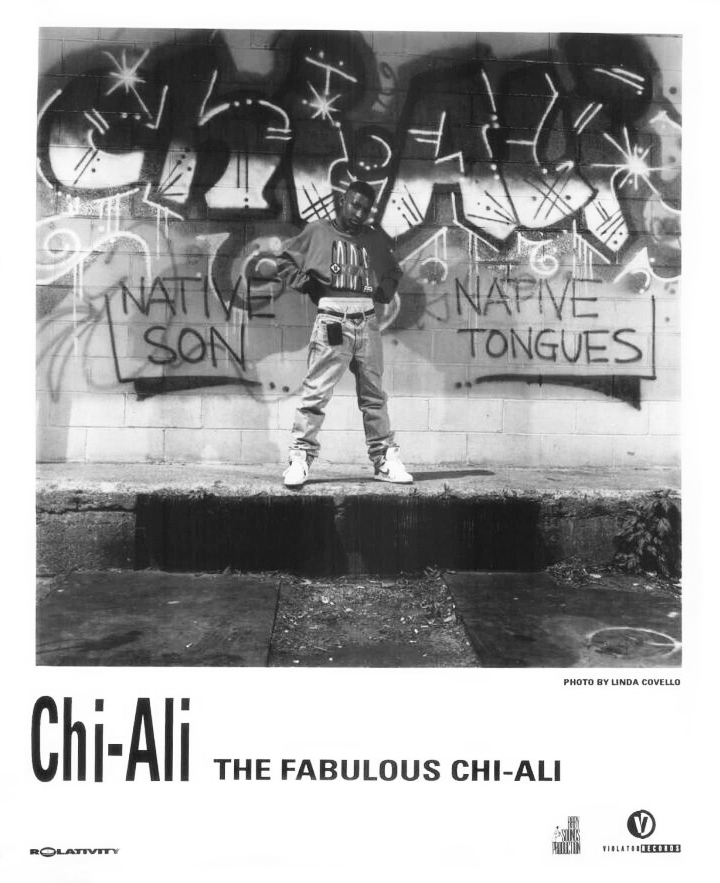Chi Ali was the youngest member of the Native Tongues, at only fifteen years of age when the collective came to life. He was also the most fashion-forward, as one might expect a teenager still in high school to be. He wore Cross Colours, the fashion trend of the moment; large sweaters with names of historically black colleges on them; baggy jeans with Nike tennis shoes. While so many of the other Native Tongues were interested in distancing themselves from the mainstream projections of hip-hop and blackness, Chi-Ali was immersing himself in them. He was also interesting because he seemed to take pleasure in both his status as the collective's little brother and his ability to rhyme about topics that, for him, seemed mature. A few years after his decline, a close comparison to his role in the Tongues would be Shyheim, who was the boy wonder of the Wu-Tang Clan, often on the outside looking in but valuable for a topical dexterity that belied his age. Chi-Ali was a precursor to that, with his album The Fabulous Chi-Ali being released in 1992 when he was sixteen, featuring production from Mista Lawnge and guest verses from Phife, Dres, Trugoy, and Fashion on the song "Let The Horns Blow." Chi-Ali's age was unmistakable in his wavering, sometimes cracking voice. But, unlike Leaders of the New School, his topical range went beyond tales of school and teenage debauchery. He rapped about sex and romance, violence and fantasies of violence, and material wealth. As far as bad boys went, Chi-Ali was the bad boy of the Native Tongues merely by drifting slightly from the path of his older counterparts. He was the edgier glimpse of youth, a kid who grew up on a slightly rougher end of the tracks and had the mind and language with which to make that plain. At one point, he felt to some like the most promising member of Native Tongues, not just because of his youth, but because of the wide range he could traverse almost seamlessly. He was the offshoot of what Native Tongues aspired to be: young people making music with each other, hoping to feed off each other's strengths. Chi-Ali was as sharp and fearless as Queen Latifah, as clever as Q-Tip, as fashion-forward and streetwise as Phife and Dres. It seemed as if he was the most likely to sustain a long and adventurous career. Cont'd below, via Hanif's Go Ahead In The Rain...
The case of Chi-Ali is both confusing and heartbreaking. After the moderate success of The Fabulous Chi-Ali, he largely vanished from hip-hop altogether, without a sound. At the end of the 1990s, he made an appearance on Dres's solo album Sure Shot Redemption, offering a short verse in the song "It's Going Down." And then he disappeared again. He surfaced in January of 2000, when he shot and killed Sean Raymond during an argument in the Bronx. Raymond was the brother of Chi-Ali's daughter's mother.... He spent over a year on the run, first in Atlanta, and then bouncing around various East Coast cities. His friends held him down, or he would hustle in places where he knew he'd be safe. He stayed south of New York, selling drugs and committing small robberies. He hit America's Most Wanted in late 2000, and then again in early 2001. In March, he made the mistake of returning to New York City. He was staying with a friend when police banged on the door, and I imagine that he was perhaps too worn down to run anymore. Being a fugitive can be exhausting, particularly with safe havens dwindling and with no crew to hold you up. - Go Ahead In The Rain by Hanif Abdurraqib (a phenomenal, must-read book!). Chi-Ali has since completed his bid, returned home to glimpses at music, a book, and has been featured in a couple documentaries as well. He did his time and his music is still celebrated to this day. Revisit 1992's The Fabulous Chi-Ali again today!




